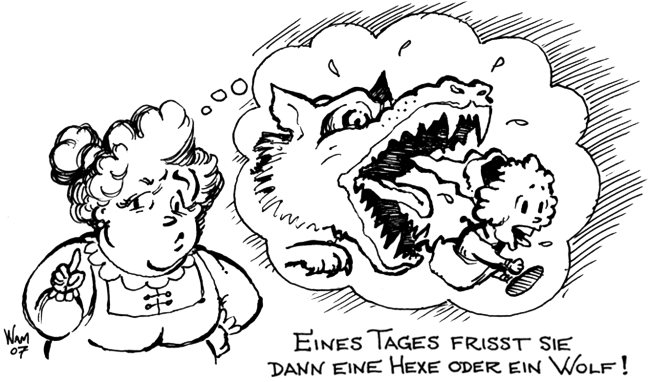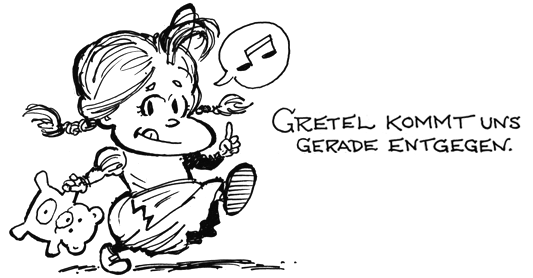Personalpronomen im Akkusativ — Personal Pronouns in the Accusative Case
Just like in English, personal pronouns in German are used to replace nouns once they have already been mentioned, including people, animals, objects, or abstract ideas. You have already learned about these pronouns in the nominative case (where they were the subject of a sentence), and now you can learn about them when they are the direct object of a sentence or the object of the prepositions durch, für, gegen, ohne, and um.
Direct objects
Just like nouns that are the direct objects of a sentence or a phrase, pronouns also change from the nominative to the accusative case.
| Rotkäppchens Mutter | Rotkäppchen, wenn du und Gretel den Wolf seht oder wenn ihr ihn trefft, geht einfach weiter und haltet nicht an! | Little Red Riding Hood, if you see the wolf or if you meet him, just keep on going and do not stop! |
| Rotkäppchen | Ja, ja, Mutti, das hast du schon gesagt. Du kennst mich doch, ich bin nicht mehr so naiv! | Yeah, yeah, mom, you have already said that. But you know me, I am not so naive anymore! |
| Rotkäppchens Mutter | Dich kenne ich, Liebling, aber du kennst Gretel. Sie ist nicht vorsichtig genug. Eines Tages frisst sie dann eine Hexe oder ein Wolf! | I know you, darling, but you know Gretel, she is not careful enough. Someday then a witch or a wolf will eat her! |
As you may have noticed among these examples, only some of the pronouns have a new form, while some of the accusative pronouns look exactly like the nominative pronouns.
Pronouns in the accusative case
| singular | plural | |
| 1st person | mich (me) | uns (us) |
| 2nd person | dich (you) | euch (y’all) |
| 3rd person masculine | ihn (him) | |
| 3rd person feminine | sie (her) | sie (them) |
| 3rd person neuter | es (it) | |
| formal | Sie (you) | |
Objects of prepositions
The accusative case is used not only when the noun or pronoun is the direct object of a sentence or a clause, but also when it follows certain prepositions: durch, für, gegen, ohne, and um. There are also a handful of prepositions – called two-way prepositions or Wechselpräpositionen – that sometimes take the accusative.
| Rotkäppchen | Pssst … Gretel kommt uns gerade entgegen. Ich möchte die Vergangenheit für sie nicht aufrühren! | Hush … Gretel is coming towards us. I don’t want to stir up the past for her. |
| Gretel | Hallo Rotkäppchen! Bist du bereit? Dann gehen wir los. Aber ich habe eine große Bitte: Der Wald ist sehr dunkel heute, können wir lieber um ihn spazieren und nicht durch ihn? | Hi Little Red Riding Hood! Are you ready? Then let’s go. But I have a big favor to ask you: The forest is very dark today, could we go around it instead and not through it? |
| Rotkäppchens Mutter | OK, Mädels, seid vorsichtig und ruft mich an, wenn ihr beim Kino ankommt. Du hast doch dein Handy, Rotkäppchen, oder? Ohne es darfst du nicht ausgehen! Das weißt du. | OK, girls, be careful and call me when you get to the movie theater. You have your cell phone, right, Little Red Riding Hood? Without it you are not allowed to go out. You know that. |



